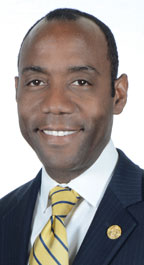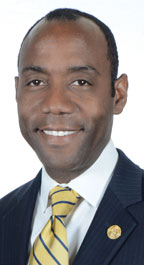 NAACP President supports President Obama’s call for prison reform
NAACP President supports President Obama’s call for prison reform
Cornel William Brooks renews call for taking down Confederate flag in South Carolina.
By Bobbi Booker, Special to the NNPA from the Philadelphia Tribune
PHILADELPHIA, PA. – Immediately following President Barack Obama’s speech in Philadelphia this week, NAACP President Cornell W. Brooks said it’s an issue the country cannot ignore.
“Just on a heart level, I could not have been more moved by the President’s speech because many of the people that were most affected by what he said couldn’t vote for him today, because they don’t have the right to vote,” he said. “Even if they could vote for him on the outside, there are millions of them locked up on the inside, out of sight and seemingly out of mind. But he made clear today they are not out of sight and they are not out of mind. And when he said there are a million fathers locked up, ask ourselves this: how many children does that represent?
“How much of America does that represent?” Brooks asked. “I thought it was an extraordinary address, and it moved me profoundly. I spent the better part of seven years in Newark, N.J., working on prison reentry; and that I have a President that says he is concerned about the issue, but not just concerned about the issue, but concerned enough to go to a prison, that’s important. Because, heretofore, no one from the White House has been in the prison, at least not while they were serving as President. So, it is very powerful.”
Since Congress enacted mandatory minimum sentences for drug crimes, the federal prison population has multiplied, from just 24,000 in the 1980s to more than 214,000, according to Families Against Mandatory Minimums. In 2010, Obama signed the Fair Sentencing Act, cut-ting penalties for crack cocaine offenses. And, last year, the independent Sentencing Com-mission reduced guideline ranges for drug crimes and applied those retroactively.
“The President is taking a major risk here: he’s standing on the side of people who have been despised, dehumanized, locked away and cast out of society,” Brooks said. “For a President who resides in the White House to go to a prison is making a statement that his oath of office speaks to people who lite-rally are out of sight and out of mind. It is a bold statement. It is a bold reform plan.
“But the President under-stands all to well: he cannot do this alone,” he added. “Congress cannot do it alone. We have to stand with him, stand behind those in Congress who are standing for criminal justice re-form, which is why we have supported America’s journey for justice in terms of talking about our lives, our votes, our jobs, our schools matter. Our lives can’t really matter if we get profiled at will. Our lives don’t really matter if in fact we can be, as a people, sentenced under draconian drug laws. Our lives, our life as a country, matters less, if you have 2.3 million people behind bars — when African-American men are 21-times more likely to lose their lives at the hands of the police than their white counterparts. We’ve got to do something about this.”
In places like Baltimore, New York and Ferguson tensions between law enforcement and their communities have spilled out into the open, underscoring longstanding concerns among minority communities they’re treated differently in the criminal justice system. As the leader of the nation’s oldest civil rights organization, Brooks has pledged to continue its mission of advocacy that began over a century ago.
“I don’t think that anyone who gathered together to create the NAACP 106 years ago could have imagined a day when we’d have the first African-American President speak to our delegates,” Brooks said. “Who could have imagined an organization, of whom only a minority were African American, to have created an iconic American institution, that being the NAACP. And, to have the first Black President stand before us and lay out a bold, visionary plan for reform?
“That was hard to imagine then, but I guess I believe today we’re called to exercise our moral and civic imagination to imagine a country in the future that represents the promise of the past,” he said. “The NAACP that we inherited is the NAACP that we should give to the next generation: bold, powerful, risk-taking, willing to do great things because we’re willing to be courageous. That’s who we are, that’s who we represent and that’s what we’re going to do.”

